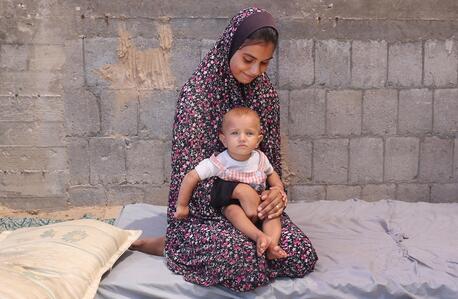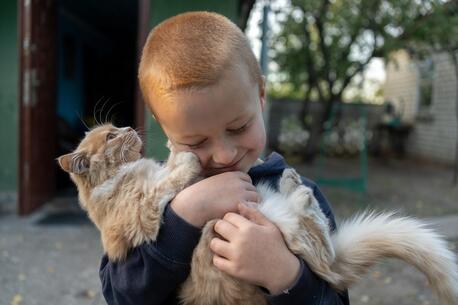
For Ukraine's Children, Invisible Scars of War
Five-year-old Arthur stopped speaking the day the bombardment began in Mariupol, Ukraine. During the first few days of shelling, Arthur's 23-year-old mother, Miranda, had to shield her terrified son from the bomb blasts with her body.
"It felt like I was being blown away by the blast wave and I almost tore my hands off, clinging to the handrails of the stairwells where we were hiding," she recalls. "We had no electricity, water, gas, heat or mobile connection. There was no bread or medicine."
For two weeks, Arthur and his mother hid in a theater. Day after day, evacuation through human corridors was delayed.
"The most terrible thing," says Miranda, "is when I have to say to him: 'In the morning, we will go to a kind world. It will be quiet and calm.' He falls asleep. In the morning, he sits and waits for something good to happen. But nothing happens."
Children need urgent help to recover from the shock of war:
Arthur and his mother are in Dnipro now, but the little boy still hasn't said a word. The invisible scars he carries will take a long time to heal.
The war in Ukraine has had a devastating impact on children like Arthur, forcing them from their homes, their schools, their daily lives. Almost three months into the war, more than 6.5 million people — 90 percent of them women and children — have left the country in search of safety. A total of 250 children have been killed and 211 wounded, according to accounts verified by OHCHR, the United Nations Human Rights Office. Actual figures are thought to be much higher.
UNICEF and partners are reaching children traumatized by war in Ukraine with essential mental health and psychosocial services
UNICEF is on the ground, working with partners to provide emergency humanitarian services for children and families devastated by the war in Ukraine — everything from safe water and medical supplies to remote education and refugee assistance. Caring for children's mental health is a key part of UNICEF's humanitarian response. Since Feb. 24, UNICEF and partners have reached 491,125 children and caregivers with mental health and psychosocial support to help them recover from the shock of war and provided case management and referral services to 46,364 children.
Both children in Ukraine and those now living as refugees in neighboring countries need urgent support to recover from the trauma they've experienced and reclaim their childhoods. Your contribution can make a difference. Please donate.
Top photo: Five-year-old Arthur hasn't said a word since shelling began in Mariupol, Ukraine. "It felt like I was being blown away by the blast wave and I almost tore my hands off, clinging to the handrails of the stairwells where we were hiding," recalls his 23-year-old mother, Miranda. © UNICEF/UN0625621/Bundzilo. Video edited by Tong Su for UNICEF USA
Children like 5-year-old Arthur need urgent help to recover from the shock of war. [VIDEO]
HOW TO HELP
There are many ways to make a difference
War, famine, poverty, natural disasters — threats to the world's children keep coming. But UNICEF won't stop working to keep children healthy and safe.
UNICEF works in over 190 countries and territories — more places than any other children's organization. UNICEF has the world's largest humanitarian warehouse and, when disaster strikes, can get supplies almost anywhere within 72 hours. Constantly innovating, always advocating for a better world for children, UNICEF works to ensure that every child can grow up healthy, educated, protected and respected.
Would you like to help give all children the opportunity to reach their full potential? There are many ways to get involved.





